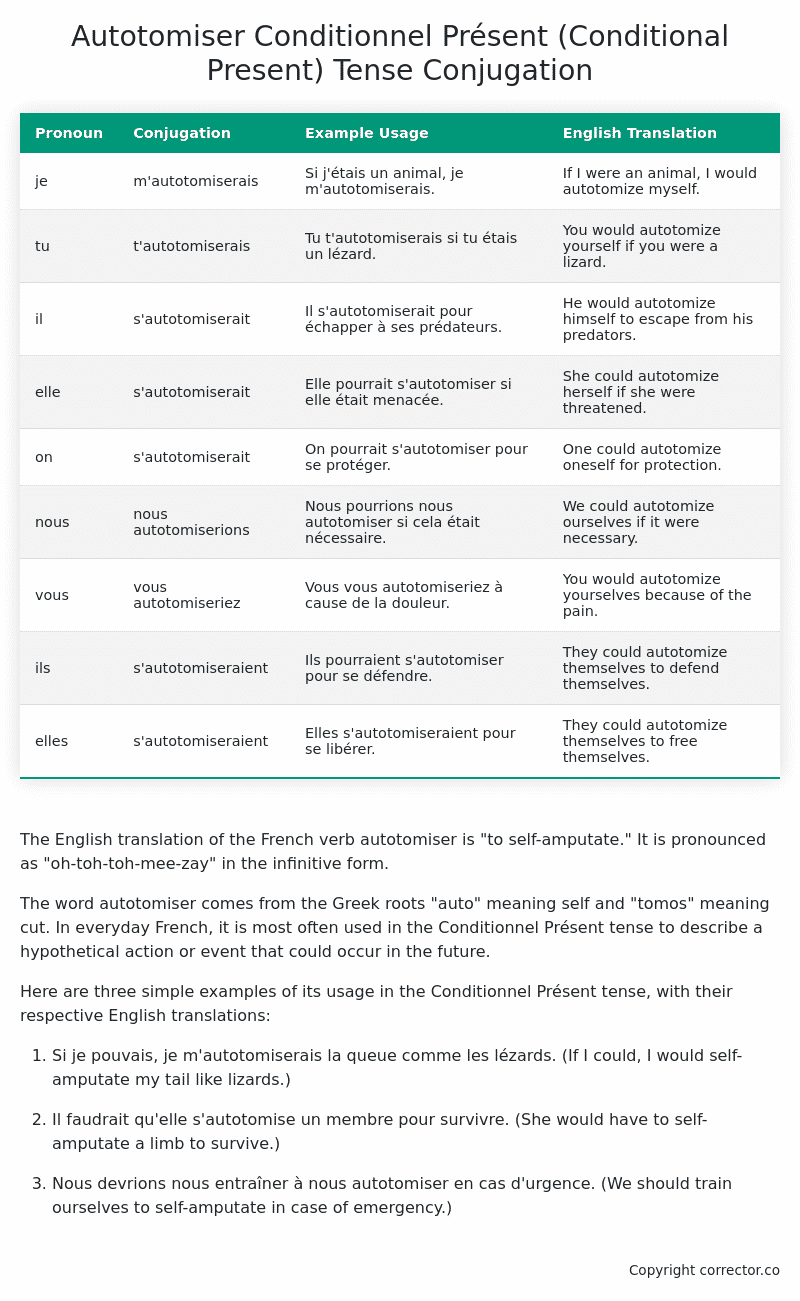Conditionnel Présent (Conditional Present) Tense Conjugation of the French Verb autotomiser
Introduction to the verb autotomiser
The English translation of the French verb autotomiser is “to self-amputate.” It is pronounced as “oh-toh-toh-mee-zay” in the infinitive form.
The word autotomiser comes from the Greek roots “auto” meaning self and “tomos” meaning cut. In everyday French, it is most often used in the Conditionnel Présent tense to describe a hypothetical action or event that could occur in the future.
Here are three simple examples of its usage in the Conditionnel Présent tense, with their respective English translations:
-
Si je pouvais, je m’autotomiserais la queue comme les lézards. (If I could, I would self-amputate my tail like lizards.)
-
Il faudrait qu’elle s’autotomise un membre pour survivre. (She would have to self-amputate a limb to survive.)
-
Nous devrions nous entraîner à nous autotomiser en cas d’urgence. (We should train ourselves to self-amputate in case of emergency.)
Table of the Conditionnel Présent (Conditional Present) Tense Conjugation of autotomiser
| Pronoun | Conjugation | Example Usage | English Translation |
|---|---|---|---|
| je | m’autotomiserais | Si j’étais un animal, je m’autotomiserais. | If I were an animal, I would autotomize myself. |
| tu | t’autotomiserais | Tu t’autotomiserais si tu étais un lézard. | You would autotomize yourself if you were a lizard. |
| il | s’autotomiserait | Il s’autotomiserait pour échapper à ses prédateurs. | He would autotomize himself to escape from his predators. |
| elle | s’autotomiserait | Elle pourrait s’autotomiser si elle était menacée. | She could autotomize herself if she were threatened. |
| on | s’autotomiserait | On pourrait s’autotomiser pour se protéger. | One could autotomize oneself for protection. |
| nous | nous autotomiserions | Nous pourrions nous autotomiser si cela était nécessaire. | We could autotomize ourselves if it were necessary. |
| vous | vous autotomiseriez | Vous vous autotomiseriez à cause de la douleur. | You would autotomize yourselves because of the pain. |
| ils | s’autotomiseraient | Ils pourraient s’autotomiser pour se défendre. | They could autotomize themselves to defend themselves. |
| elles | s’autotomiseraient | Elles s’autotomiseraient pour se libérer. | They could autotomize themselves to free themselves. |
Other Conjugations for Autotomiser.
Le Present (Present Tense) Conjugation of the French Verb autotomiser
Imparfait (Imperfect) Tense Conjugation of the French Verb autotomiser
Passé Simple (Simple Past) Tense Conjugation of the French Verb autotomiser
Passé Composé (Present Perfect) Tense Conjugation of the French Verb autotomiser
Futur Simple (Simple Future) Tense Conjugation of the French Verb autotomiser
Futur Proche (Near Future) Tense Conjugation of the French Verb autotomiser
Plus-que-parfait (Pluperfect) Tense Conjugation of the French Verb autotomiser
Passé Antérieur (Past Anterior) Tense Conjugation of the French Verb autotomiser
Futur Antérieur (Future Anterior) Tense Conjugation of the French Verb autotomiser
Subjonctif Présent (Subjunctive Present) Tense Conjugation of the French Verb autotomiser
Subjonctif Passé (Subjunctive Past) Tense Conjugation of the French Verb autotomiser
Subjonctif Imparfait (Subjunctive Imperfect) Tense Conjugation of the French Verb autotomiser
Conditionnel Présent (Conditional Present) Tense Conjugation of the French Verb autotomiser (this article)
Conditionnel Passé (Conditional Past) Tense Conjugation of the French Verb autotomiser
L’impératif Présent (Imperative Present) Tense Conjugation of the French Verb autotomiser
L’infinitif Présent (Infinitive Present) Tense Conjugation of the French Verb autotomiser
Struggling with French verbs or the language in general? Why not use our free French Grammar Checker – no registration required!
Get a FREE Download Study Sheet of this Conjugation 🔥
Simply right click the image below, click “save image” and get your free reference for the autotomiser Conditionnel Présent tense conjugation!

Autotomiser – About the French Conditionnel Présent (Conditional Present) Tense
Formation
Common Everyday Usage Patterns
Expressing Polite Requests
Expressing Hypothetical Situations
Expressing Doubt or Uncertainty
Interactions with Other Tenses
Present Tense
Past Tense
Future Tense
Conditional Perfect
Summary
Want More?
I hope you enjoyed this article on the verb autotomiser. Still in a learning mood? Check out another TOTALLY random French verb conjugation!


